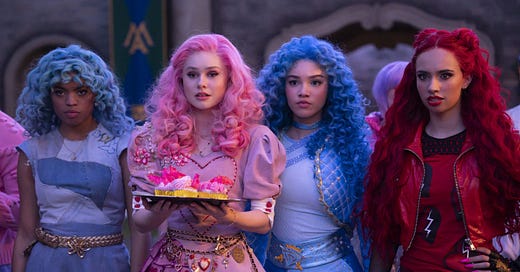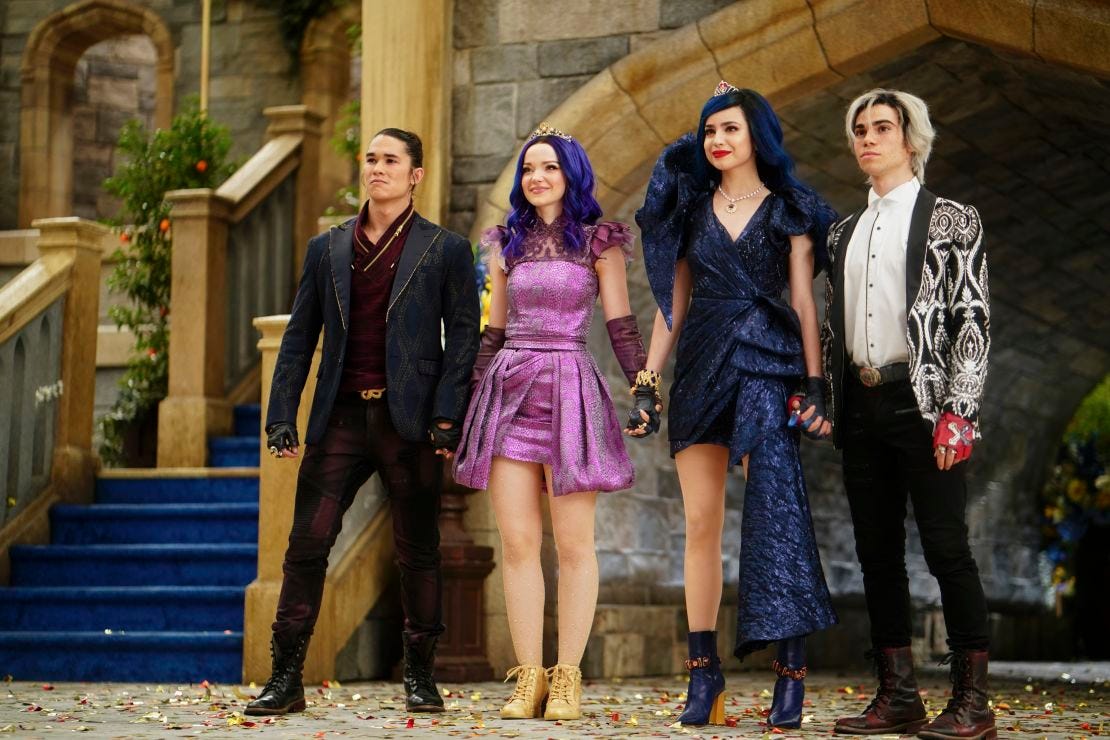This Time Traveling Disney+ Movie Makes No Sense
We need to talk about 'Descendants: Rise of Red.' Yes, really. [9/2/2024]
Let me begin by recommending that you do NOT see this movie. Like the Disney Channel Movie trilogy it spins out of, Rise of Red suffers from its tween stagey C-movie schlock that deserves no place outside the TV movie realm. Even within the confines of a tv screen, it doesn't even reach the relative heights of the Mouse Channel's Teen Beach Movie or High School Musicals. You’re more likely to get a worthwhile experience out of seeing any junky picture in theater right now than the movie being discussed today. But having been forced to watch it anyway by some younger siblings who shall remain nameless, I have some interesting, if scattered, takeaways about the current state of children’s entertainment.
Spoilers and cheesy direct-to-streaming kids’ movie plot ahead!
The film takes place in the same universe as the original Descendants trilogy, where all the Disney fairytales have been united under one kingdom. The princesses, princes, heroes, and other good characters all live in a magical modern world, where iPhones and magic wands can occupy the same pocket. This musical utopia is predicated on forcing the villains of the Disney stories, such as the Evil Queen and Cruella DeVille, onto an island isolated from the rest of the world. The original trilogy follows four descendants (yep) of original Disney villains as the first persons from this Isle of the Lost to join the kingdom's Hogwarts equivalent, Auradon Prep. Typical high school drama ensues, laced with magical antics, romantic pairings, and evil plots.
Descendants: Rise of Red retreads this formula, but rather than having a descendant from the island of villainy, Red, the titular high schooler, is the teenage daughter of the Queen of Hearts, transferring to prep school from the realm of Wonderland. When her mother decides to use Red's school invitation to take over the kingdom, Red must go back in time to stop the school prank against her mother that supposedly turned her evil in the first place. Through contrivance, she brings along Chloe, the daughter of Cinderella. It is worth noting that Cinderella is played by Brandy Norwood, reprising the role from a 1997 film alongside Paolo Montalban as her prince, since she gives the only performance in this picture that wouldn't be at home on a middle school stage.
What follows is the plot of Back to the Future, only without an ending. Red and Chloe must stop the plot to prank a young Queen of Hearts that will ultimately turn her wicked before the school dance. And they do, and then the movie ends. Seriously. Our duo discovers the prankster is Ursula's younger sister Uliana, and without much trouble or trial prevent her from stealing the spellbook she needs to prank Red's mother. But wait; that's only half true! Our protagonists are lucky that the spellbook has been cursed by Principal Merlin (yeah that one). It freezes the bully and her lackeys on the spot once they open it. Regardless of the actions of Red and Chloe, the bullies would not have been able to prank Red's mother at all. One would expect that a twist is coming, perhaps one in which the kind but not innocent Cinderella is the true culprit of the prank that turned the card-carrying queen evil. Now Red and Chloe have to race to stop that incident from happening at the school dance while learning about the complexities of both their parents. But that doesn't happen! There’s no payoff to the school dance or the dynamic between the teenage versions of the parents and their kids from the future. After witnessing Uliana’s failure, the protagonists simply zap back home to discover Red's mother has had a change of hearts! They celebrate her transformation from naughty to nice with a final dance party before the film ends with a straight-to-audience tease that the story isn't over.
The protagonists of this convoluted time-travel movie seemingly shouldn't have any effect on the plot at all, although the film wants us to think they do. Their actions do nothing to stop the all-so-important prank that will make Red’s mother evil. Instead they have a few colorful musical numbers in the past with their parents, discover what is going to take place, and then watch it happen. No character development. No learning. No trials. I’ve seen better narratives on the back of a cereal box. At some screenwriting lecture out there, Robert McKee just got a stomachache.
Why did I write about Descendants: Rise of Red? Because every issue that plagues modern cinema can be seen here. From its roots in major anti-intellectualism and lack of literacy to the supporting trunk of streaming-based strategies straight up into its wasteful profit-driven IP-mining franchise-building intentions, this film is pure packaging for regurgitation and reconsumption on every platform. The Madame Web and Mean Girls of Hollywood churn out moments made for TikTok and explainers for Collider rather than scenes and stories for the big screen. Yet Red rises above them all as the most mindless, mind-numbing “content” of the sloppiest order; there is no reason for its existence except as an attraction and distraction for children. They’ll consume what they’re told to.
Red and Chloe are archetypical children’s protagonists of the moment. They are styled in colorful post-Jojo Siwa glamor and make up for it with bland personality. Red jokes about each situation with Disney-trained sass and rebel without a cause relatability. Her arc will be self-validation for seeing how the system kept her down. In recent Disney history, she is Moana, Raya, Mirabel, or, in Pixar, Coco, and Mei Lee. She does not fit in, and good for her. Chloe is the straight-laced rule keeper, the royalty who must learn to disrespect the rules. Others will rag on her for being royalty until she smashes the glass slippers her mother passed down to her, symbolically renouncing that privilege for her friends. From them, children can learn that breaking the rules is the best way to be true to yourself and that the rules of parents, whether fair princesses or evil queens, are ultimately worth fighting against.
The original Descendants movies, for all their faults, were at least comprehensible immigrant stories while still featuring similar morals. It is the extra layer of laziness with which this is served that makes this film maleficent, pun intended. Nobody expects much from a movie like this, much less a Disney+ sequel to a Disney Channel original. But the lack of basic storytelling reveals the kinds of messages these movies will carry thoughtlessly by default. For better and for worse, the kinds of stories being fed to children are corporate gobbledygook that tells them that the status quo is always wrong, while simultaneously attaching childish whimsy, magic, and nostalgia to that message. Disney, lazily more than malevolently, raises their audience to accept the laziest forms of entertainment with half-hearted coming-of-age stories that rebel against the system. It’s cool, and in fact part of growing up, to question your parents; they’ve already paid the Disney+ subscription.
In our anti-thought culture, this film would quietly slip through the cracks, without any intellectual voice against them. Writing an article about it like this comes across as taking to a tomato with a machete. But as film critics, cinephiles, and responsible adults, being aware of the entertainment, mindless or not, that children ingest is part of our collective cultural responsibility. Adults, for the most part, are the ones who will read this article, and create the next generation’s childhood cinema. We shape young minds no matter what; please, let’s do it thoughtfully. Thus, as a conscientious critic, I must pronounce that Descendants: Rise of Red is, in its hazy colorful stupor, rotten to the core.







